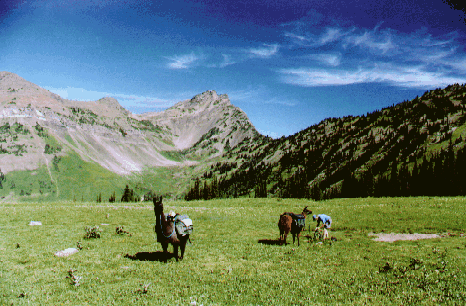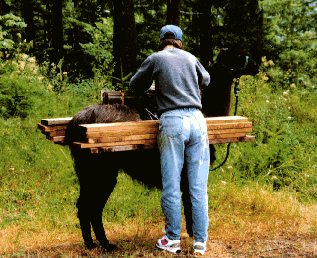Llama care, management and resources
- Llama FAQ
- Llama literature
- Basic care
- Castration
- Spaying
- About breeding llamas
- Handling young llamas
- Misdirected territorial aggression
- How old should llamas be for training and work?
Packing with llamas
Fiber from llamas
Llamas
as guardians
Classic performance llamas
Communicating
Our llama family
Just for fun
Cria photos
Training consultation
Performance
llama analysis
If you don't rescue ... DON'T BREED!
If you don't rescue ... DON'T BREED!
Packing with Llamas

Packing was the reason we originally decided to purchase llamas. Even though we liked the animals, like most people, we felt we needed justification to have them. Jim had been a backpacker for many years. Gwen's lone backpacking experience was enough to make anyone swear off backcountry travel forever. Llamas have kept Jim -- knee surgery, back problems, and all -- in the backcountry. Ranger Dusty got Gwen back into the wilderness, and his assistance has allowed her to continue hiking despite serious knee problems of her own. In fact, Gwen now enjoys her backcountry strolls so much that she's likely to be hiking from sunup to sundown (and sometimes later) for as many days as she can wheedle off work. Fortunately, Dusty is one of the rare llamas that can rise to the occasion and match this demanding style of travel.
Llama packing isn't for everyone. If you are a long-distance backpacker who now covers as much or more ground as Gwen does, you'll sadly be hard-pressed to find llamas with the stamina to keep up -- the selection emphasis has been on fashion, not function, for the past decade. Most that can are not for sale, although a few people such as ourselves are striving to breed llamas that can do the job and make them available. No matter what your traveling style, you'll find that having someone else to feed, groom, load and unload at least twice a day takes time from your travels and other plans. In addition, using any pack animal means markedly different choices for camping sites, need for additional water and grazing stops, and additional items and food to take along.
On the other hand, llamas open the door to the backcountry for others. People with physical limitations or small children can now continue packing with the addition of calm, lightweight, low-impact llamas to carry the load. Although solo backcountry travel is discouraged, many people must travel alone or stay at home. A llama to carry the load (plus additional gear that might have been left at home to save weight) can add a margin of safety for a lone hiker and, with knowledgable and intelligent handling, will not significantly increase danger. And many hikers, solo or otherwise, simply find llamas to be welcome companions on the trail and in camp.

Llamas are also welcome on trail maintenance crews. Most are volunteer affairs. We gladly donate our time to the local ranger district several days a year as a way of giving back our share of work for the trails we use elsewhere -- and another fun thing we can do with our llamas! Llamas can haul in gravel, lumber, poles -- you name it. All it takes is a calm, well-trained packer and an ingenious handler.
It takes an excellent pack llama to satisfactorily meet the average human's backcountry demands. Therefore, successfully packing with llamas, selecting good pack llamas, and selecting and using pack equipment all require some education on the part of the hiker. Educating an untrained pack prospect requires even more knowledge, and also carries a substantial risk that the llama physically won't work out as a packer. We recommend that prospective and beginning llama packers visit the Backcountry Llama's website, subscribe to The Backcountry Llama Newsletter, and get a copy of Gwen's booklet, "Evaluating a Llama Pack for Comfort and Function," available from Lost Creek Llamaprints. Also, do talk to successful recreational llama packers, and observe them in action to see if their results are what you want. You have the right to set your own standards (up to what llamas are willing and capable of delivering). An essential means of ensuring that a particular llama can pack by at least minimal standards is by taking them on a hike yourself (expect the owner to accompany you). Location and schedules permitting you could also ask the owner to enter the llama in a PLTA pack trial (at the level of your choice) with you as the handler. Although PLTA criteria are minimal when compared to the full spectrum of demands humans make on pack llamas, they are solid, basic criteria. A llama is highly unlikely to attain "PLTA Master Pack Llama" certification without being handleable, reasonably capable and willing on the trail.
One word of caution -- commercial llama packers
and "trekkers" (picnic lunch and overnight trip guides
catering to out-of-shape city dwellers) are always eager to advise,
but their methods and packing style aren't entirely applicable
-- and sometimes seem foreign -- to recreational packers' desires.
Commercial packers don't need to be concerned if a llama is unsociable
with humans, won't lead, or won't travel without another llama.
Their trips are short (3-8 miles, which many humasn discover
is no longer very far if they aren't carrying the pack!), on
cleared trail, include as many rest days as hiking days, and
are understandably scheduled for predictably moderate weather.
The recreational packer usually desires the flexibility to travel
farther and over more difficult terrain if he or she chooses,
and doesn't have the luxury of planning every trip for ideal
weather, or of having another llama to pull the reluctant one(s)
along. Many (though not all) commercial packers use and recommend
techniques that save time, but can inhibit or destroy those traits
so desirable in a personal pack llama.
More information and articles:
Conformation, Utility and Llamas
Packing with female llamas
Research on temperature regulation and heat stress
Return to Lost Creek Llamas home page